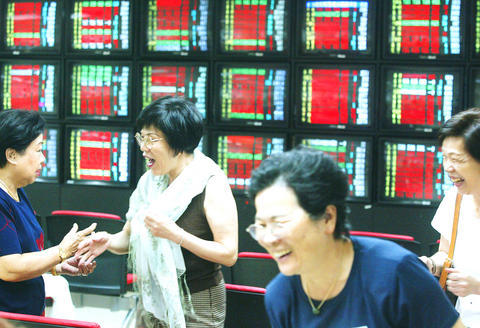Citigroup Global Markets Inc revised upward its rating on Taiwan's stock market yesterday, when the red-hot benchmark index rallied to a new seven-year high, fueled by a continued robust buying spree.
"Taiwan, our biggest underweight, becomes an overweight, finally -- the contrast could not be starker," Markus Rosgen, Citigroup Global Markets Inc's chief Asian strategist, said in a research note yesterday.
Relative to the region, valuations in Taiwan's market have dropped to levels only seen in crisis periods, Rosgen said.

PHOTO: CNA
"This is a value, not momentum, play," he wrote.
The TAIEX peaked at 15 points shy of the 9,000 level in intraday trading before closing at 8,939.19 -- the highest since June 2000.
The index rose 1.43 percent, or 126.28 points amid heavy turnover of NT$184.33 billion (US$5.6 billion), Taiwan Stock Exchange's data showed.
Foreign investors bought a net NT$14.57 billion in stocks yesterday, bringing their net purchases to NT$170.67 billion since the beginning of the month, the stock exchange's data showed.
Citigroup Global Markets Inc suggested investors "head north" by switching out of Singapore into Taiwan and South Korea, although the call might go against market consensus, it said.
"The north is a play on an improving global economy, higher inflation, large caps over mid/small caps, and value over momentum," Rosgen said.
Earlier this month, Peter Kurz, head of Citigroup's Taiwan equity research, raised his forecast for the TAIEX to 9,550 points, saying the government typically gave the market a boost in the runup to a major election and this time would be no different.
Taiwan is holding a presidential election next March.
Holding a similar view, Yin Nai-yun (
"Taiwan has sound industrial fundamentals but lacks capital momentum," Yin, who manages funds of more than NT$6.2 billion, told the Taipei Times on the sidelines of a media briefing yesterday.
Prudential Financial expects foreign investors to allocate funds to Taiwan and cash in on the local market's cheap valuations.
The company likes high-tech stocks and expects the handset, flat panel and integrated circuit (IC) design industry to bottom out and rebound in the next quarter.
The investment firm forecast a 10 percent growth in global handset shipments, an end to inventory adjustment in the previous quarter, stronger flat-panel sales as it enters its high season and better IC design sales as the Vista effect boosts replacement demand, the company said.
Investors betting on longer-term returns can consider China-concept stocks that could benefit from the nation's rising domestic consumption, which is estimated to double in the next four years to 12 trillion yuan in 2010, the company said.
These include food manufacturers that have set up footholds in China, such as Uni-President Enterprise Corp (統一企業) and Dachan Great Wall Group (大成集團), and tourism stocks, it said.

Quanta Computer Inc (廣達) chairman Barry Lam (林百里) is expected to share his views about the artificial intelligence (AI) industry’s prospects during his speech at the company’s 37th anniversary ceremony, as AI servers have become a new growth engine for the equipment manufacturing service provider. Lam’s speech is much anticipated, as Quanta has risen as one of the world’s major AI server suppliers. The company reported a 30 percent year-on-year growth in consolidated revenue to NT$1.41 trillion (US$43.35 billion) last year, thanks to fast-growing demand for servers, especially those with AI capabilities. The company told investors in November last year that

Intel Corp has named Tasha Chuang (莊蓓瑜) to lead Intel Taiwan in a bid to reinforce relations between the company and its Taiwanese partners. The appointment of Chuang as general manager for Intel Taiwan takes effect on Thursday, the firm said in a statement yesterday. Chuang is to lead her team in Taiwan to pursue product development and sales growth in an effort to reinforce the company’s ties with its partners and clients, Intel said. Chuang was previously in charge of managing Intel’s ties with leading Taiwanese PC brand Asustek Computer Inc (華碩), which included helping Asustek strengthen its global businesses, the company

Taiwanese suppliers to Taiwan Semiconductor Manufacturing Co. (TSMC, 台積電) are expected to follow the contract chipmaker’s step to invest in the US, but their relocation may be seven to eight years away, Minister of Economic Affairs J.W. Kuo (郭智輝) said yesterday. When asked by opposition Chinese Nationalist Party (KMT) Legislator Niu Hsu-ting (牛煦庭) in the legislature about growing concerns that TSMC’s huge investments in the US will prompt its suppliers to follow suit, Kuo said based on the chipmaker’s current limited production volume, it is unlikely to lead its supply chain to go there for now. “Unless TSMC completes its planned six

Power supply and electronic components maker Delta Electronics Inc (台達電) yesterday said it plans to ship its new 1 megawatt charging systems for electric trucks and buses in the first half of next year at the earliest. The new charging piles, which deliver up to 1 megawatt of charging power, are designed for heavy-duty electric vehicles, and support a maximum current of 1,500 amperes and output of 1,250 volts, Delta said in a news release. “If everything goes smoothly, we could begin shipping those new charging systems as early as in the first half of next year,” a company official said. The new